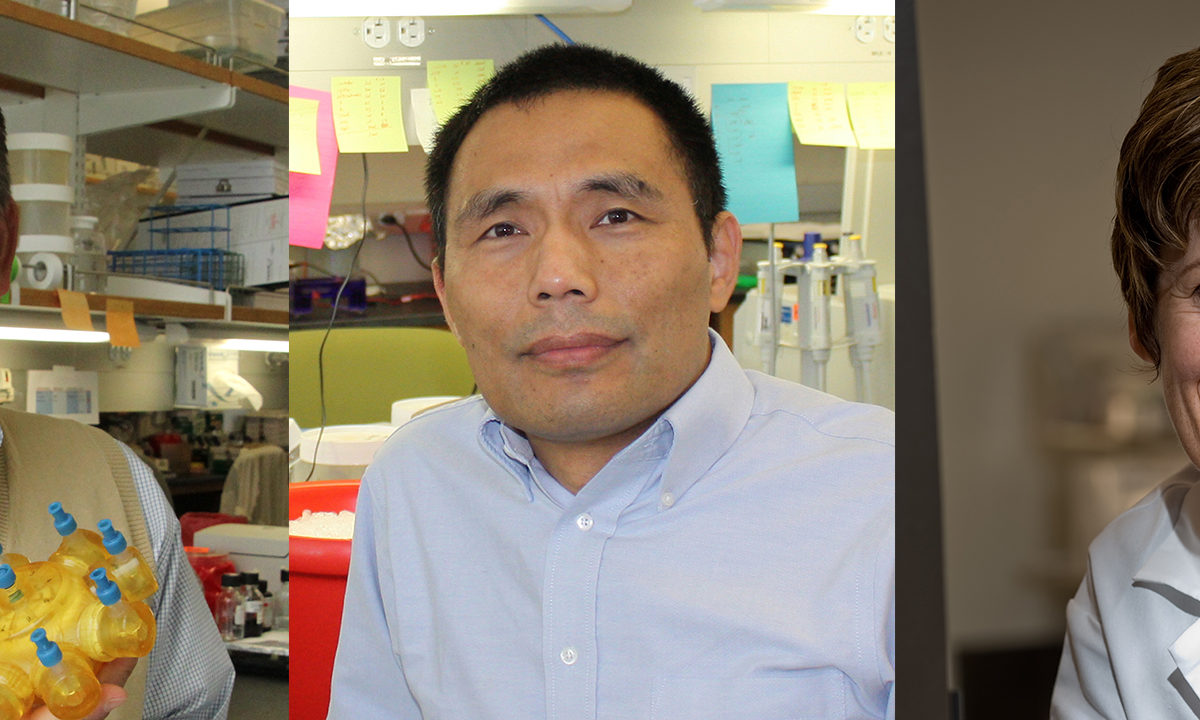
Three scientists from Keck Medicine of USC have won grants exceeding $4.3 million from the California Institute for Regenerative Medicine (CIRM) for research that includes creating a temporary liver for patients, finding novel ways to treat immune disorders and blood diseases, and developing new animal models for heart failure, diabetes and neurodegenerative diseases.
The grants, received by USC Stem Cell Principal Investigators Paula Cannon, Toshio Miki and Qi-Long Ying, are part of the CIRM Tools and Technologies initiative, supporting projects addressing the challenges of translating stem cell discoveries into cures. The winners were chosen from among 212 proposals to create, design and test the key technologies needed to usher in the era of regenerative medicine.
“Sometimes even the most promising therapy can be derailed by a tiny problem,” said Jonathan Thomas, chair of CIRM’s governing board. “These awards are designed to help find ways to overcome those problems, to bridge the gaps in our knowledge and to ensure that the best research is able to keep progressing and move out of the lab and into clinical trials in patients.”
Miki’s team at the Eli and Edythe Broad Center for Regenerative Medicine and Stem Cell Research at USC plans to develop what he calls an “extracorporeal liver support system (ELS)” for patients with liver failure. The ELS will house a collection of human liver cells, produced from stem cells, in a device outside of the patient’s body but connected to the patient’s circulation. The ELS will therefore be able to function as a temporary liver: removing toxins, preventing irreversible brain damage, and giving the patient’s own liver a chance to recover and regenerate.
If successful, the device will allow patients to recuperate without undergoing liver transplantation.
Miki, also an assistant professor of research in the Department of Biochemistry and Molecular Biology at the Keck School of Medicine of USC, received the award for his proposal “Development of a clinical-grade extracorporeal liver support system using human induced pluripotent stem cell-derived hepatic cells.” The project is an international collaboration with Katrin Zeilinger at Charité University, Berlin, and Frank Shubert at Stem Cell Systems GmbH with additional support from Germany’s Federal Ministry for Education and Research (BMBF).
Cannon plans to improve the precision and safety of “targeted nucleases,” which she describes as “scissors” used to edit specific genes in hematopoietic or blood-forming stem cells. Cannon hopes to develop the next generation of targeted nucleases to treat severe immune deficiencies and blood diseases, such as sickle cell disease.
Cannon and her colleagues have already developed a targeted nuclease that could potentially cure HIV/AIDS by introducing a mutation in a gene called CCR5 that confers natural immunity to HIV. Heading into clinical trials, the approach is inspired by the “Berlin patient,” a man cured of both HIV and leukemia through a bone marrow transplant from a donor with a CCR5 mutation.
Cannon — a principal investigator with USC Stem Cell and associate professor of Molecular Microbiology and Immunology, Pediatrics, and Biochemistry and Molecular Biology at the Keck School — received the award for her proposal “Site specific gene editing in hematopoietic stem cells as an anti-HIV therapy.”
Ying, also at the Eli and Edythe Broad Center for Regenerative Medicine and Stem Cell Research at USC, plans to use stem cell-based technology to create some of the world’s most sophisticated laboratory rats for research into new therapies for heart failure, diabetes and neurodegenerative diseases.
Transgenic rats will provide an even more powerful tool than transgenic mice, which have allowed scientists to study and model a wide range of diseases that also occur in humans for nearly 25 years. The rat is widely accepted as more similar to the human in its physiology, which is essential for cardiac, metabolic and neurological studies.
An associate professor of Stem Cell Biology and Regenerative Medicine at the Keck School, Ying received the award for his proposal “Embryonic stem cell-based generation of small animal models for assessing human cellular therapies.” He is collaborating with USC colleagues Justin Ichida, Bangyan L. Stiles and Ching-Ling (Ellen) Lien, who is also affiliated with The Saban Research Institute of Children’s Hospital Los Angeles.
“At USC, we are committed to developing the critical tools and technologies for the broader scientific community to translate stem cell discoveries into patient cures,” said Andy McMahon, director of the Eli and Edythe Broad Center for Regenerative Medicine and Stem Cell Research at USC, and chair of the department and university-wide initiative in stem cell research. “We are grateful for this ongoing support invested in CIRM by the voters in California. Their investment is accelerating the progress of scientists at USC and other world-class universities within the state towards the future of regenerative medicine.”
